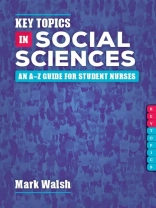Key Topics in Social Sciences is a collection of short articles summarising the most important concepts in sociology and psychology that nursing and healthcare students will need to understand.
Each entry is intended to give a brief introduction to the topic as a prompt for writing essays and assignments.
- Arranged in alphabetical order so you can find entries quickly and easily
- Short entries take you straight to the heart of each topic
- A great starting point for essays and assignments
- Ideal for revision before assessments and exams
- Cross-references and further reading suggestions provided so you can study in more depth as needed.
From reviews:
“It’s a really easy to use book, the layout is very user friendly and I like the references for further reading at the end of each section. I would really recommend this book to all student nurses as it can help support most assignments.”
Third-year nursing student, University of Surrey
قائمة المحتويات
A
Age and Ageing; Agency; Alienation; Altruism; Anti-psychiatry; Anxiety; Attachment; Attitudes; Attribution theory; Authority; Autonomy
B
Behaviour; Behaviour modification; Behaviourism; Biomedical model; (The) Body
C
Capitalism; Causality; Challenging behaviour; Child abuse; Child development; Child poverty; Citizenship; Classical conditioning; Clinical iceberg; Cognitive perspective; Cognitive behavioural therapy; Cognitive development; Cognitive dissonance; Community; Conformity; Consumerism / consumption; Culture
D
Data; Defence mechanisms; Demography; Depression; Developmental norms; Disabilities; Discourse; Discrimination; Diversity; Division of labour
E
Early experiences; Eating disorders; Emotion; Emotional intelligence; Emotional labour; Empathy; Epidemiology; Equalities; Ethics; Ethnicity; Evaluation
F
Families; Family therapy; Feminism; Freud; Functionalism
G
Gender; Genetics; Globalisation; Group(s) / group dynamics; Group therapy
H
Health; Humanistic perspective; Human Rights; Hypothesis
I
Ideal type; Identity; Identity politics; Ideology; Industrialisation; Inequalities; Interactionism; Intersectionality
L
Labelling theory; Learning difficulties (and learning disabilities); Life chances; Loss
M
Market; Marxism; Maslow’s hierarchy of needs; Medicalisation; Memory; Mental illness; Migration; Modernity; Moral panic; Morbidity and mortality; Motivation
N
Narrative(s); Need; Neuroscience
O
Obedience; Operant conditioning
P
Paradigm; Patriarchy; Perception; Personality; Person-centred counselling; Personalisation; Phobias; Piaget, Jean; Postmodernism; Positive psychology; Post-traumatic stress disorder (PTSD); Poverty; Power; Prejudice; Profession; Psychiatry; Psychoanalysis; Psychodynamic perspective; Psychological interventions; Psychological perspective; Public sphere
R
Realism; Reflexivity; Reinforcement; Research methods; Resilience; Risk assessment; Rogers, Carl; Role / role theory; Role models
S
Science; Self; Self-actualisation; Self-concept and self-esteem; Self-harm; Separation (and loss); Sexuality; Sick role; Social action and social structure; Social class; Social constructionism; Social institution; Social learning theory; Social mobility; Social model of health; Social policy; Social support; Socialisation; Socialism; Society; Sociological perspective; Sociology; Status; Stereotyping; Stigma; Stress (and coping)
U
Unconscious mind; Underclass; Urbanisation
V
Values; Violence (and aggression)
W
Welfare; Welfare state












